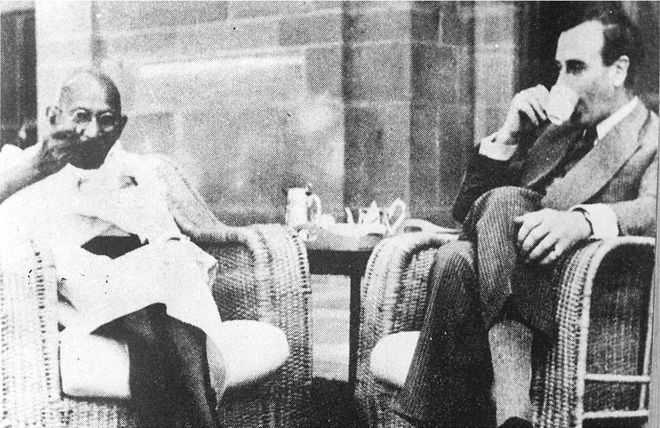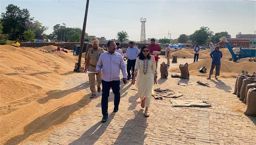
Gandhi hoped Abdullah’s pro-India sentiment would disprove the two-nation theory.
Vappala Balachandran
ex-Special Secretary, Cabinet secretariat
Mahatma Gandhi visited Kashmir on August 5 and 6, 1947. He wanted to tour the troubled state much earlier, but had faced opposition from Viceroy Mountbatten and surprisingly, also from Sardar Patel. The years 1946-1947 were turbulent. Sheikh Abdullah (National Conference) was imprisoned for his ‘Quit Kashmir’ agitation against Maharaja Hari Singh. Balraj Puri had claimed in 1993 that the ‘All Jammu & Kashmir Rajya Hindu Sabha (the earliest incarnation of the present Bharatiya Janata Party in the state)’ supported the Maharaja’s ‘independence’ policy. Those advocating a merger with ‘secular India’ like him or Mulk Raj Saraf (Editor, Ranbir, banned in June 1947) were condemned as ‘anti-Hindu traitors’.
Mountbatten had given a frank account of these eventful days in his letters to British PM Clement Attlee, published in 1948 as ‘Report on the Last Viceroyalty-22 March-15 August, 1947’. Mountbatten did not want Nehru to head the States Department, created in June to deal with the princes, as Nehru had given them an ‘ultimatum’ on April 19 to join the Constituent Assembly. He was happy that Patel was chosen to head that department as he could get accessions from as many princes as possible before August 15, 1947.
Mountbatten had also given instances of his personal interventions to persuade problem states, including Bikaner, Indore, Jodhpur and Bhopal. Lionel Carter, who had edited the book, had said the Viceroy had even used his influence to alter the Radcliffe boundary award to divert three Punjab tehsils to India to favour his friend the Maharaja of Bikaner, whose state was getting water from the headworks of Ganga Canal located in these tehsils. Yet neither Mountbatten nor Patel showed any hurry in getting Kashmir’s accession, although it had strategic importance by having international boundaries.
Gandhi met Mountbatten early in June, wanting to visit Kashmir instead of Nehru or ‘prepare the way for Pandit Nehru’. Mountbatten parried him by telling that he would first go to meet the Maharaja, ‘who was an old acquaintance’. The visit took place during June 18- 23. Mountbatten advised Hari Singh not to make the independence declaration. He conveyed Patel’s message that ‘the States Department were prepared to give an assurance that, if Kashmir went to Pakistan, this would not be regarded as unfriendly by Government of India’. But Mountbatten’s mission was a failure.
Mountbatten received Gandhi on June 26. He found him ‘distressed about Kashmir’. He demanded that either ‘he or Pandit Nehru must go there at once’. Rajmohan Gandhi, Patel’s biographer, had said ‘Gandhi prayed that Kashmir would disprove the two-nation theory’ with ‘Abdullah’s pro-India sentiment’. A reluctant Mountbatten relented and asked Hari Singh to ‘accept a visit from Gandhi as causing less trouble …than a visit from Pandit Nehru’. On July 29 he met Gandhi, Nehru and Patel to decide who (Gandhi or Nehru) should go. Patel told him that neither should go but ‘bluntly added: ‘If it is a choice between two evils, I consider Gandhiji’s visit would be the lesser evil’”.
Mountbatten permitted Gandhi’s visit with no political speeches. He added: ‘It was only with the greatest of difficulty that Pandit Nehru was persuaded to acquiesce in this decision. I was privately informed that, when Sardar Patel tried to reason with him the night before our meeting, Pandit Nehru had broken down and wept, explaining that Kashmir meant more to him than anything else’.
Gandhi’s delitescent notes (August 5 and 6, 1947 — Collected Works) and his symbolic gesture of taking Begum Abdullah with him for prayer meetings revealed his sharp legal mind and Chanakya niti. He could not write openly because of Mountbatten’s ban. He said he addressed three prayer meetings attended by thousands and was struck by the communal harmony in the state. ‘They had one language, one culture and so far as he could see, they were one people’. He was also able to meet the Maharaja and family.
He said the 1846 Amritsar Treaty was a ‘sale deed’ between the British and Gulab Singh, which would be ‘dead on 15th August’. He felt that ‘paramountcy of Kashmiri people will begin’ after 15 August, 1947. He was ‘glad to say that the Maharajah Saheb and Maharani Saheba readily acknowledged the fact’. He conveyed to Patel on August 6, 1947, that he had sent a note to Nehru who would show it to him. ‘I think you should do something in the matter. In my opinion the situation in Kashmir can be saved’. He was suggesting to Patel how to deal with Kashmir’s accession.
Legally Gandhi was correct. Section 7(1) (b) of the India Independence Act 1947 had said all treaties between the Crown and Indian rulers would lapse on 15th August. But Patel’s ‘passivity’ (to use Rajmohan Gandhi’s expression) continued.
Patel missed another opportunity. Nehru, according to Durga Das, wrote a letter on September 27, 1947, to Patel about the alarming situation in Kashmir: ‘I understand that the Pakistan strategy is to infiltrate into Kashmir now and to take some big action. I hope you will be able to take some action’. He suggested using ‘National Conference’ assets. But the invasion came on October, 22, 1947. Puri had said it was the NC cadres who were helping the Indian Army by providing trucks and manpower, resulting in the spectacular success.
It is thus surprising to hear PM Modi telling our Parliament on February 7, 2018: ‘If the country’s first prime minister was Sardar Vallabhbhai Patel, then this part of my Kashmir would not have been with Pakistan today’. On the contrary, an undivided Kashmir would have been with us had Patel, who was in total charge of the princely states under Mountbatten, followed Gandhi advice.



























